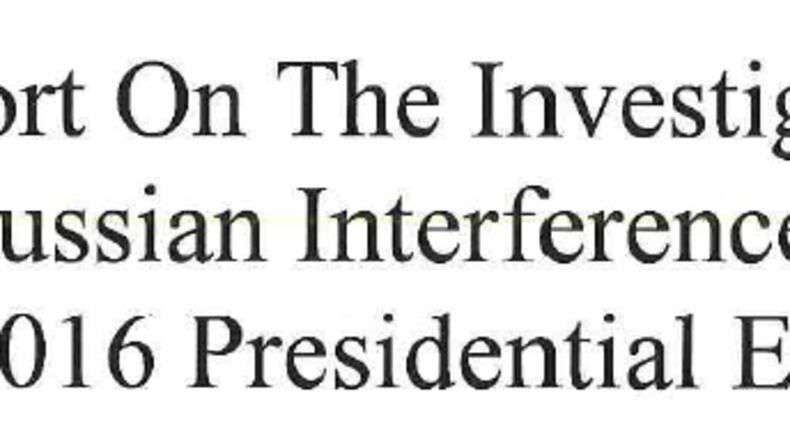"McGahn did not carry out the direction, however, deciding that he would resign rather than trigger what he regarded as a potential Saturday Night Massacre," referring to the episode in the Watergate investigation where President Richard Nixon fired special prosecutor Archibald Cox.
President Trump asked White House Counsel Don McGahn to have Mueller removed from office. When it became a story, Trump told McGahn to deny it. McGahn refused. pic.twitter.com/sLhRRGfDJ9
— Gregory Korte (@gregorykorte) April 18, 2019
Later, when press reports emerged stating that the President has ordered McGahn to fire Mueller, the report says the President then 'directed White House officials to tell McGahn to dispute the story and create a record stating he had not been ordered to have the Special Counsel removed.'
McGahn again refused to follow the President's order - defying him in an Oval Office meeting.
"McGahn refused to back away from what he remembered happening and perceived the President to be testing his mettle," the report concluded.
There were other stories of top aides similarly ignoring the President, such as Corey Lewandowski, who was told by Mr. Trump to get Attorney General Jeff Sessions to publicly state that the Russia investigation was 'very unfair' to Mr. Trump.
First in June of 2017, then again a month later, Mr. Trump used a private meeting to press Lewandowski - an outside adviser - to get Sessions 'to limit the Special Counsel investigation to future election interference.'
But like the White House Counsel, Lewandowski balked, and refused to follow the President's request, going so far as to ask a senior White House official - Rich Dearborn - to do the dirty work for him.
"Dearborn was uncomfortable with the task and did not follow through," the report stated.
After McGahn refused to fire Mueller, Trump tells Lewandowski to get AG Sessions to call the probe "very unfair."
— Jamie Dupree (@jamiedupree) April 18, 2019
Lewandowski doesn't do it and tries to get Rick Dearborn to deliver the message. Dearborn refused. pic.twitter.com/J0F2BENRx0
The report also details how the President tried to lobby senior leaders of the U.S. Intelligence Community to help him limit the Russia probe, as Mr. Trump complained to Director of National Intelligence Dan Coats, his daily intelligence briefers, and top officials at the National Security Agency.
In late March of 2017, the President complained directly to DNI Coats, who counseled that it would be best to allow the investigations to 'run their course,' and not interfere with the work of FBI Director James Comey.
While Coats did not tell investigators that he felt directly pressured to act, his top aides told a different story, that "Coats was upset because the President has asked him to contact Comey to convince him there was nothing to the Russia investigation."
Mr. Trump also called the head of the National Security Agency, Admiral Mike Rogers, to weigh in on the Russia investigation - a conversation that so alarmed Rogers and a top deputy that they immediately drafted a memo, and placed it in an NSA safe to memorialize the communications with the President, much as Comey had done after his own meetings with Mr. Trump.
Mueller: Trump called intelligence officials asking for help in refuting the Trump-Russia story. NSA leaders immediately wrote a memo and put it in a safe. pic.twitter.com/44lvON20h3
— Jamie Dupree (@jamiedupree) April 18, 2019
Intelligence officials also said the President complained about the Russia investigation during his daily briefings, and asking for messages of support in the news media.
"On at least two occasions, the President began Presidential Daily Briefings by stating that there was no collusion with Russia and he hoped a press statement to that effect could be issued," the report said.
NSA chief Rogers recalled a private talk with Mr. Trump where the President vented his frustration, "and said something like the 'Russia thing has got to go away.'"
In another example from July of 2017, President Trump was ready to fire Attorney General Jeff Sessions, but encountered resistance from White House Chief of Staff Reince Priebus.
"Even though Priebus did not intend to carry out the President's directive, he told the President he would get Sessions to resign," the report stated.
Priebus later told the President that Sessions could not be ousted, because other top officials - including Deputy Attorney General Rod Rosenstein, and Associate Attorney General Rachel Brand would also resign - setting off a Saturday Night Massacre type of situation for President Trump.
In the end, the Mueller investigation found that top aides to the President had saved Mr. Trump from possible legal jeopardy, mainly by ignoring his demands on the Russia investigation.
"The President's efforts to influence the investigation were mostly unsuccessful, but that is largely because the persons who surrounded the President declined to carry out orders or accede to his requests," the Mueller report concluded.
Top Democrats in Congress immediately made clear they want more information about the obstruction matters.
"As we continue to review the report, one thing is clear: Attorney General Barr presented a conclusion that the president did not obstruct justice while Mueller's report appears to undercut that finding," said House Speaker Nancy Pelosi and Senate Democratic Leader Charles Schumer.
Not surprisingly, the White House saw things differently, as the redacted version of the Mueller report was issued.
— Donald J. Trump (@realDonaldTrump) April 18, 2019
On the issue of collusion, the Mueller report stated the investigation 'identified numerous links between the Russian government and the Trump campaign' - but that there was no evidence that the campaign had 'conspired or coordinated with the Russian government in its election interference activities.'
Mueller seems likely to be asked directly about his investigation in May, as House Judiciary Committee Chairman Rep. Jerry Nadler (D-NY) said he would ask Mueller to testify next month.
Attorney General Barr is already scheduled for two days of testimony before the House and Senate on May 1 and May 2.
About the Author

